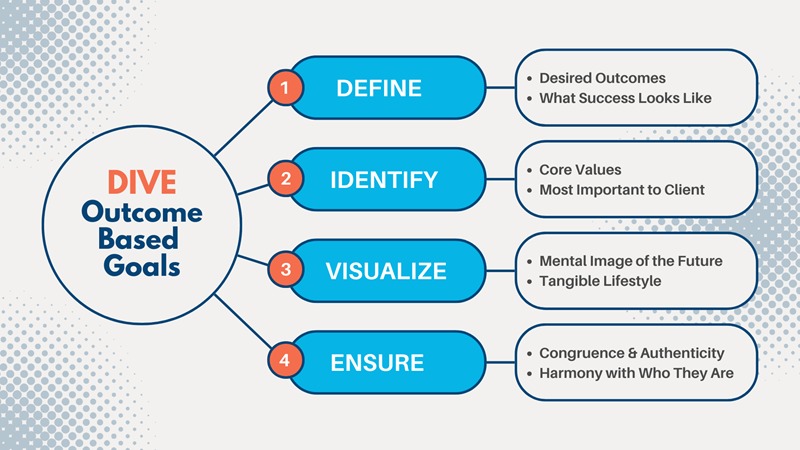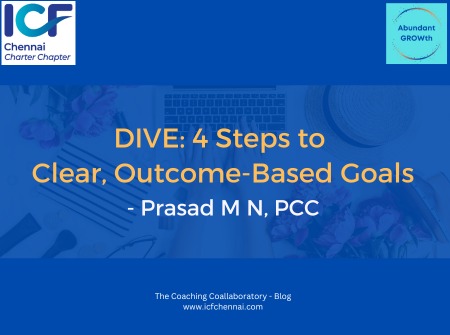Understanding Outcome-Based Goal Setting in Coaching Conversations
Consider a coach helping an individual navigate toward their desired career. This pivotal moment will significantly influence their future destiny. Here, outcome-based goal planning, a core component of the GROW coaching framework, becomes critically important. This blog post delves into the essence of goal setting, ensuring that the mental images formed naturally and accurately reflect what is presented. Coaches can assist clients in clearly and intuitively expressing and achieving their goals by effectively utilizing values, congruence, and metaphorical vision.
The Significance of Goal Setting in Coaching Conversations
Goal setting is the foundation for successful coaching outcomes. Goals are more than just destinations; they are logical roadmaps that guide all subsequent actions. If there are no clear goals, coaching sessions can easily become disorganized. Goals provide guidance, drive, and purpose. They help clients determine their genuine desires and identify the necessary steps to achieve their goals.
Values: The Foundation of Meaningful Goals
“Internal images should be exactly what is described”
Before diving into goal setting, it is essential to understand the core values that naturally motivate a client. Values are underlying principles that guide decisions and behavior. When goals reflect a person’s underlying values, they become more meaningful and motivating. Coaches should inquire about what their clients value most in their ideal career. Is it creativity, autonomy, financial stability, or making a difference in the world?
Clients should imagine their ideal job and take note of any notable attributes. Coaches should encourage in-depth discussions of these elements. This practice assists individuals in discovering their values and developing an internal picture that is consistent with their deepest wishes.
Congruence: Aligning Goals with the Authentic Self
Congruence ensures that goals are aligned with the client’s true self. When goals are congruent, there is a natural connection between the client’s desires and who they genuinely are. This alignment promotes ease and intuitiveness in achieving the aim.
During goal setting, coaches should encourage clients to reflect on their previous experiences and accomplishments. Which trends do they notice? What are their inherent strengths? Recognizing these characteristics enables clients to develop objectives that are both ambitious and attainable, as well as in line with their natural strengths and interests.
Metaphorical Visualization: Creating Powerful Internal Images
To enhance goal setting, coaches should use metaphorical visualization. This strategy uses metaphors to paint a vivid internal picture of the client’s objectives. For example, if a client’s ideal career resembles mountain climbing, coaches should assist them in visualizing each stage of the journey. What do the peaks represent? What obstacles might they encounter, and how will they overcome them?
This strategy helps clients perceive their goals in a motivating and manageable manner. It delves into their creative brain, making the path to their goal seem natural and intuitive. When clients picture their development symbolically, the path to their ideal employment becomes clearer and more tangible.
DIVE – A 4-Step Framework for Creating an Outcome-Based Goal for a Dream Career
1. Define the Desired Outcome:
 Begin by having the client clearly articulate the ultimate career goal. The client should vividly describe their dream job, including aspects such as the role, responsibilities, industry, and work environment. It is essential to determine what success looks like in this dream career.
Begin by having the client clearly articulate the ultimate career goal. The client should vividly describe their dream job, including aspects such as the role, responsibilities, industry, and work environment. It is essential to determine what success looks like in this dream career.
2. Identify Core Values:
Explore the client’s core values that must be honoured in their dream career. The client should reflect on the aspects of a job that are most important to them, such as creativity, autonomy, financial stability, or making a positive impact. These values will help ensure that the goal is meaningful and motivating.
3. Visualize the Future:
The client should create a detailed mental image of their future in this dream career. This visualization should include the emotions they experience, their daily activities, and the overall lifestyle they envision. This step helps solidify the goal by making it more tangible and inspiring. Coaches should encourage clients to vividly visualize their success. What emotions do they experience? What does their daily life look like? This internal picture should be detailed, creating a mental image that motivates and inspires throughout the journey.
4. Ensure Congruence with the Authentic Self:
Coaches should confirm that the dream career goal aligns with the client’s authentic self. They should invite the client to reflect on past experiences, natural strengths, and passions to ensure that the goal is not only ambitious but also realistic and in harmony with who they truly are. This alignment fosters ease and motivation in pursuing the goal.
To conclude, by skillfully incorporating outcome-based goal setting into coaching interactions, coaches enable clients to construct internal images that exactly match their descriptions. This strategy naturally enhances clarity and focus by aligning goals with one’s true self, resulting in a more rewarding and successful career path.
When coaches support goal setting that is deeply aligned with their clients’ values and true selves, they lay a strong foundation for success. Clients become aware of their own potential and are motivated to pursue their ideal careers with confidence and purpose. Their actions are driven by the internal images they construct, resulting in limitless possibilities and outcomes that exceed their initial expectations.
You can connect with Prasad M N Click Here


